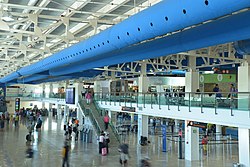Top Qs
Timeline
Chat
Perspective
Licenciado Gustavo Díaz Ordaz International Airport
International airport in Puerto Vallarta, Jalisco, Mexico From Wikipedia, the free encyclopedia
Remove ads
Licenciado Gustavo Díaz Ordaz International Airport (Spanish: Aeropuerto Internacional Licenciado Gustavo Díaz Ordaz)(IATA: PVR, ICAO: MMPR), simply known as Puerto Vallarta International Airport (Aeropuerto Internacional de Puerto Vallarta), is an international airport serving Puerto Vallarta, Jalisco, Mexico. It serves as a gateway to the Mexican tourist destination of Riviera Nayarit and the Jalisco coast year-round, offering flights to and from Mexico, the United States, Canada, and the United Kingdom. The airport also houses facilities for the Mexican Army and supports various tourism, flight training, and general aviation activities. Operated by Grupo Aeroportuario del Pacífico, it is named after President Gustavo Díaz Ordaz.
Remove ads
Ranked as the fifth-busiest airport in Mexico for international passenger traffic and the seventh-busiest in terms of passenger numbers and aircraft operations,[2] it has witnessed rapid growth, becoming one of the country's fastest-growing airports: in 2021, it served 4.1 million passengers, increasing to 6.8 million in 2024. The airport connects travelers to 52 destinations, including 13 domestic and 39 international, served by 23 airlines.[1]
Remove ads
Facilities
Summarize
Perspective

The airport is situated within the Puerto Vallarta Urban area, just one km north of Marina Vallarta, at an elevation of 7 metres (23 ft) above mean sea level. It features a single runway, designated as 04/22, measuring 3,100 metres (10,200 ft) in length with an asphalt surface. The commercial aviation apron provides twelve aircraft parking positions next to the terminal and eight remote positions. The general aviation apron offers stands for fixed-wing aircraft and heliports for private aviation.
Passenger terminals
The passenger terminal is a two-story structure. The ground floor includes the main entrance, a check-in area, and the arrivals section, housing customs and immigration facilities, as well as baggage claim services. Additionally, amenities such as car rental services, taxi stands, snack bars, and souvenir shops are available. The upper terminal floor features a security checkpoint and a departures area divided into two sections.

Concourse A (Gates 1-5A) caters to domestic flights and includes waiting areas with shops, food stands, and a VIP Lounge.[3] The concourse is equipped with five gates: gates 1-3 on the top floor have jet bridges, while gates 4 and 5 on the ground floor allow passengers to board directly from the apron. Airlines operating from this concourse include Aeromexico, Aeromexico Connect, Viva Aerobus, Volaris, TAR, and Magni.
Concourse B is situated in a satellite building connected to the main terminal by a walkway. This concourse serves international flights, primarily from the United States and Canadian airlines. It offers seating areas, food stands, restaurants, a VIP lounge, and duty-free shops.[3] The satellite has 15 gates (gates 6-20B) spread across two floors, with those on the top floor equipped with jet bridges. All international airlines operate from this area.[4]

In 2022, the construction of a new Terminal 2 officially began.[5] The terminal is projected to cover more than 68,000 square metres (730,000 sq ft), featuring significant expansions, resulting in an increase from 9 to 16 remote boarding gates and from 11 to 19 boarding bridges. The development also encompasses improvements to parking facilities and the establishment of a new bus terminal. Terminal 2 is planned to have the capacity to mobilize 4.5 million passengers annually and aims to become the first airport in Latin America certified as NET Zero.[6]
Other facilities

In the vicinity of the passenger terminal, various facilities are situated, including civil aviation hangars, courier and logistics companies, and cargo services. Additionally, there is a dedicated general aviation terminal that supports a range of activities such as tourism, flight training, executive aviation, and general aviation.
Air Force Station No. 5 (Spanish: Estación Aérea Militar N.º 5, Campo Militar N.º 41-A) (E.A.M. No. 5) is located on the airport grounds, north of Runway 04/22. This station does not currently have active squadrons assigned to it. It features an aviation platform spanning 5,400 square metres (58,000 sq ft), one hangar, and other facilities designed to accommodate Air Force personnel.[7]
Remove ads
Airlines and destinations
Summarize
Perspective

Intense seasonal tourism to Puerto Vallarta means that passenger traffic at the airport is notably focused on flights to the United States and Canada. Among the busiest routes at the airport are those to Los Angeles, Dallas, and Phoenix. WestJet stands out as the airline serving the largest number of destinations, connecting Puerto Vallarta with 12 Canadian airports during the high season.
Passenger









Destinations map
European destinations from Puerto Vallarta International Airport Red = Year-round destination Blue = Future destination Green = Seasonal destination |




Remove ads
Statistics
Passengers
Graphs are unavailable due to technical issues. Updates on reimplementing the Graph extension, which will be known as the Chart extension, can be found on Phabricator and on MediaWiki.org. |
Puerto Vallarta Airport Passengers.
See Wikidata query.
Busiest routes
- Notes
Remove ads
See also
- List of the busiest airports in Mexico
- List of airports in Mexico
- List of airports by ICAO code: M
- List of busiest airports in North America
- List of the busiest airports in Latin America
- Transportation in Mexico
- Tourism in Mexico
- Grupo Aeroportuario del Pacífico
- List of beaches in Mexico
- List of Mexican military installations
- Mexican Air Force
- Economy of Jalisco
- Riviera Nayarit
- Nuevo Vallarta
Notes
References
External links
Wikiwand - on
Seamless Wikipedia browsing. On steroids.
Remove ads








